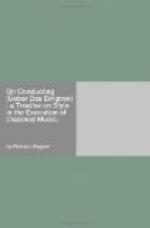This worrying and driving to death of the principal theme at the close of a piece is a habit common to all our orchestras—very frequently indeed nothing is wanting but the sound of the great horse-whip to complete the resemblance to the effects at a circus. No doubt increase of speed at the close of an overture is frequently demanded by composers; it is a matter of course in those cases where the true Allegro theme, as it were, remains in possession of the field, and finally celebrates its apotheosis; of which Beethoven’s great overture to “Leonora” is a celebrated example. In this latter case, however, the effect of the increased speed of the Allegro is frequently spoilt by the fact that the conductor, who does not know how to modify the main tempo to meet the various requirements of the thematic combinations (e.g., at the proper moment to relax the rate of speed), has already permitted the main tempo to grow so quick as to exclude the possibility of any further increase—unless, indeed, the strings choose to risk an abnormal rush and run, such as I remember to have heard with astonishment, though not with satisfaction, from this very Viennese orchestra. The necessity for such an eccentric exertion arose in consequence of the main tempo having been hurried too much during the progress of the piece; the final result was simply an exaggeration—and moreover, a risk to which no true work of art should be exposed—though, in a rough way, it may be able to bear it.
However, it is difficult to understand why the close of the Freyschutz overture should be thus hurried and worried by Germans, who are supposed to possess some delicacy of feeling. Perhaps the blunder will appear less inexplicable, if it is remembered that this second cantilena, which towards the close is treated as a chant of joy, was, already at its very first appearance, made to trot on at the pace of the principal Allegro: like a pretty captive girl tied to the tail of a hussar’s charger—and it would seem a case of simple practical justice that she should eventually be raised to the charger’s back when the wicked rider has fallen off—whereat, finally, the Capellmeister is delighted, and proceeds to apply the great whip.
An indescribably repulsive effect is produced by this trivial reading of a passage, by which the composer meant to convey, as it were, a maiden’s tender and warm effusions of gratitude. [Footnote: See the close of the Aria in E, known as “Softly sighing,” in Der Freyschutz (No. 8).] Truly, certain people who sit and listen again and again to a vulgar effect such as this, whenever and wherever the Freyschutz overture is performed, and approve of it, and talk of “the wonted excellence of our orchestral performances”—and otherwise indulge in queer notions of their own about music, like the venerable Herr Lobe, [Footnote: Author of a “Kompositionslehre,” “Briefe eines Wohlbekannten,” etc.] whose jubilee we have recently celebrated— such people, I say, are in the right position to warn the public against “the absurdities of a mistaken idealism”—and “to point towards that which is artistically genuine, true and eternally valid, as an antidote to all sorts of half-true or half-mad doctrines and maxims.” [Footnote: (See Eduard Bernsdorf in Signale fur die musicalishe Welt, No. 67, 1869).]




